Employee Data Management
A secure, organised way to collect, store, and update employee information—from onboarding to exit. It reduces errors, supports compliance, and ensures accurate data is always at hand for better HR decisions.
What is Employee Data Management?
Employee Data Management keeps essential records organised, secure, and easy to access. Modern HR systems replace paper files and spreadsheets with digital tools that reduce paperwork, improve accuracy, and simplify daily HR tasks.
 Identity details
Identity details Contact information
Contact information Job titles
Job titles Salary history
Salary history Documents and certifications
Documents and certifications
 Attendance logs
Attendance logs Skill sets
Skill sets Appraisals
Appraisals Benefits records
Benefits records Compliance documents
Compliance documents
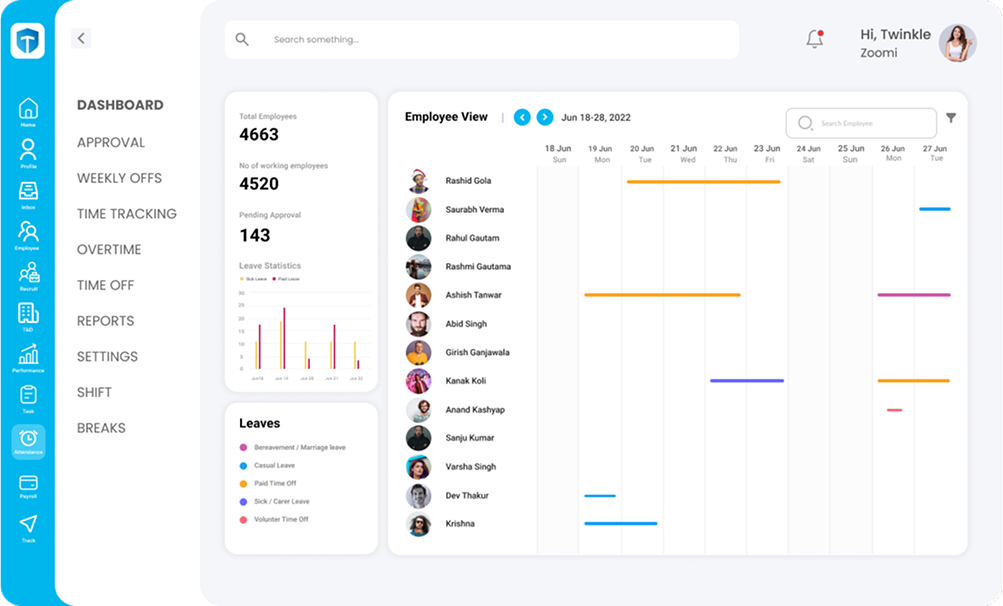
Why Is It Important?
Managing employee data is more than just about keeping records. It helps HR handle payroll, benefits, compliance, and performance tracking. A good system positively minimises issues like
 Repeated or missing data
Repeated or missing data Payroll or benefits delays
Payroll or benefits delays
 Missed steps during audits
Missed steps during audits
 Hard to track employee updates
Hard to track employee updates
Key Aspects of Employee Data Management
Organised Employee Information
Digital Document Storage
Who Can See What
Real-Time Updates
Compliance and Record-Keeping
Search and Reporting
Organised Employee Information
Maintain a comprehensive, single source of truth for every employee.
 Personal and contact details
Personal and contact details
 Bank and statutory information
Bank and statutory information
 Emergency contacts
Emergency contacts
 Employment history and job role
Employment history and job role
 Skills, certifications, and experience
Skills, certifications, and experience
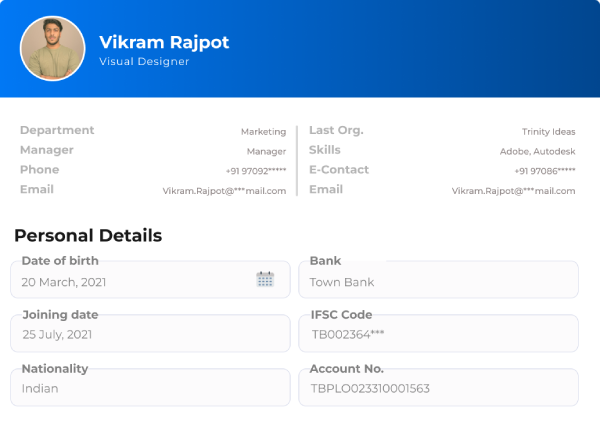
Digital Document Storage
Store and access employee documents securely from one place.
 Offer letters and contracts.
Offer letters and contracts.
 ID proofs and compliance forms
ID proofs and compliance forms
 Performance reviews and exit documents
Performance reviews and exit documents
 Secure upload and version tracking
Secure upload and version tracking
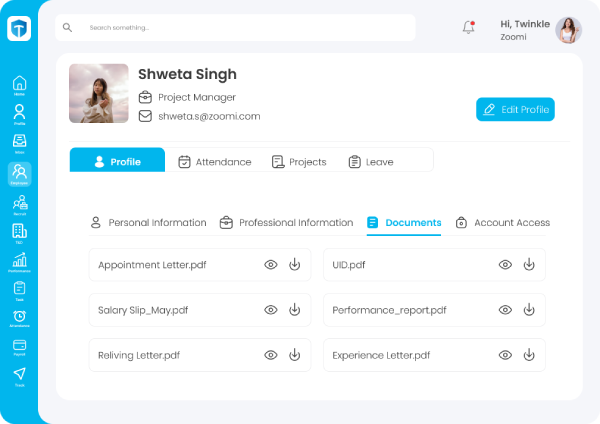
Who Can See What
Ensure data privacy and restrict visibility based on roles.
 HR sees all records
HR sees all records
 Managers see their team's data
Managers see their team's data
 Logs track every change
Logs track every change
 Employees update their own info (if permitted)
Employees update their own info (if permitted)
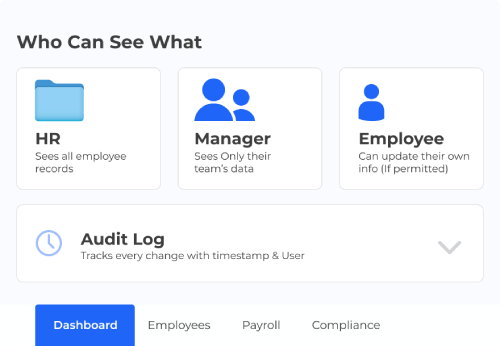
Real-Time Updates
Keep records current throughout the employee lifecycle.
 Update status during transfers or exits
Update status during transfers or exits
 Reflect changes in role, salary, or team
Reflect changes in role, salary, or team
 Auto-update after onboarding
Auto-update after onboarding
 Connect data between attendance, payroll, and compliance
Connect data between attendance, payroll, and compliance
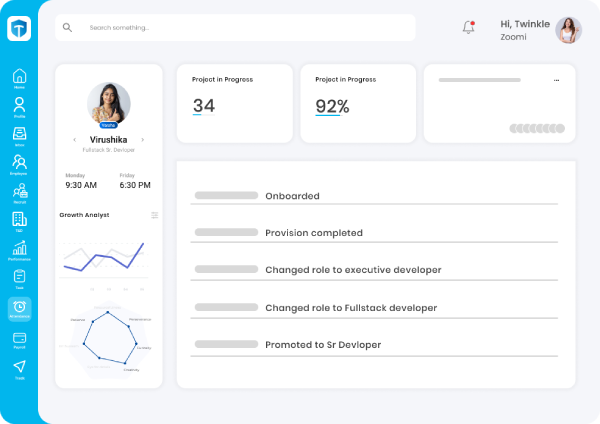
Compliance and Record-Keeping
Maintain statutory records required under employment laws.
 Address proof, PAN, Aadhaar, and UAN
Address proof, PAN, Aadhaar, and UAN
 PF, ESI, and income tax records
PF, ESI, and income tax records
 Historical logs of changes
Historical logs of changes
 Auto-alerts for missing or outdated data
Auto-alerts for missing or outdated data
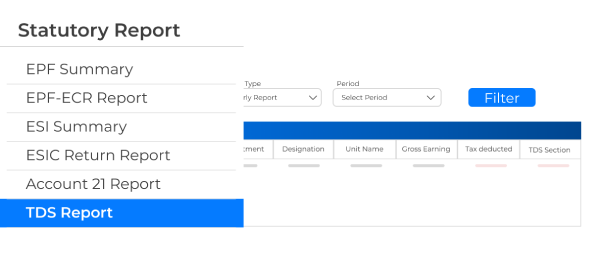
Search and Reporting
Quickly locate employee data or generate reports as needed.
 Configurable dashboards for HR insights
Configurable dashboards for HR insights
 Exportable formats for audit, payroll, or MIS
Exportable formats for audit, payroll, or MIS
 Quickly locate employee data or generate reports as needed.
Quickly locate employee data or generate reports as needed.
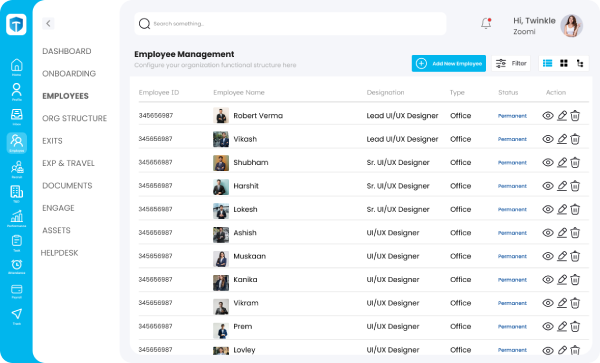
Benefits of a Robust Employee Data Management System
Managing employee data well keeps HR smooth and reliable. A single system saves time, improves accuracy, and supports compliance.
 Accurate payroll and attendance
Accurate payroll and attendance Time saved for HR teams
Time saved for HR teams Audit-ready records
Audit-ready records
 Secure, controlled access
Secure, controlled access Easy employee self-service
Easy employee self-service
What Kind of Data Is Typically Managed?
An employee data management system covers a wide range of information, including:
Things to Consider When Choosing a Data Management System
When picking a system to manage employee data, choose one that suits your needs. Make sure it keeps data secure, makes daily tasks simpler, and can grow with your business.
 Data Security
Data Security Scalability
Scalability Ease of Use
Ease of Use
 Integration
Integration Custom Fields
Custom Fields Audit Trails
Audit Trails
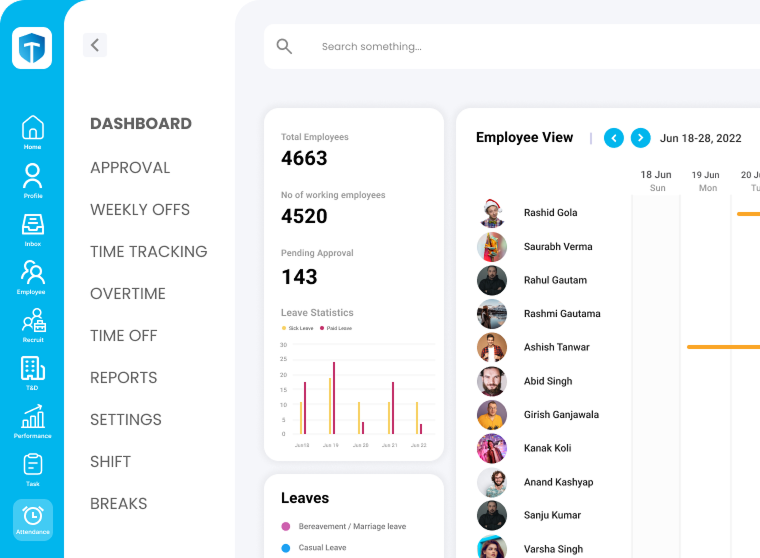
FAQs
01.How often should employee data be updated?
Data should be updated in real time as changes occur, such as promotions, address changes, or benefit updates. Many systems allow employees to update their own basic details.
02.Can employees access their own data?
Yes. Most systems offer self-service portals where employees can view or request updates to their records.
03. What happens to employee data after someone leaves the company?
Exit data is stored securely for record-keeping, final settlements, and audit purposes. Retention periods may vary based on company policy and legal requirements
04. Is employee data protected under Indian labour laws?
While India does not yet have a standalone data protection law, companies are expected to handle employee data responsibly under various labour regulations and upcoming data protection guidelines.
05. How does employee data management improve payroll accuracy?
With synced records of working days, attendance, and statutory details, payroll calculations are based on real-time, accurate inputs.s





